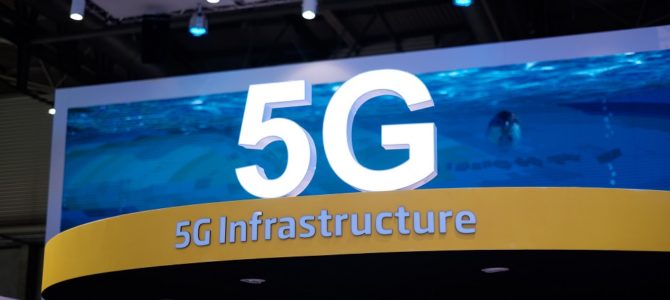
President Donald Trump blocked Singapore-based Broadcom Ltd.’s $117 billion hostile bid for U.S.-based Qualcomm Inc. earlier this week, citing national security concerns after the Committee on Foreign Investment in the U.S. (CFIUS) raised similar questions.
This is the first time a U.S. president has used executive powers to block a private company’s acquisition. Why are President Trump and CFIUS so concerned with this particular acquisition? It all boils down to a race against China over 5G technology.
What Is 5G Technology?
5G, the fifth generation of cellular technology, is the next-generation “big thing” for wireless networking and the “Internet of things.” Smartphone users will get faster and more reliable service. For example, it will allow your phone to run 10 times faster than the current 4G network, so you can download a 3D movie in 30 seconds.
But it’s more than that. Current 4G technology can’t handle the amount of data transmission demanded by emerging technology like driverless cars, virtual reality, and network robots. However, a 5G network not only can, but also can reduce the lag time between devices and the servers they communicate with to zero.
5G technology is so important that in January President Donald Trump’s national security team proposed to have the U.S. government build a 5G wireless network to counter China’s threat to U.S. cyber security and economic security. But wireless companies, some lawmakers, and even communication regulators rejected that idea.
Federal Communications Commission (FCC) Chairman Ajit Pai, a Republican appointed by Trump, said in a statement back in January that “Any federal effort to construct a nationalized 5G network would be a costly and counterproductive distraction from the policies we need to help the United States win the 5G future.”
The Race Between Qualcomm and Huawei
Thus in the United States, the effort to develop 5G technology remains in the hands of private companies. The company leading the effort is San Diego-based Qualcomm, the world’s largest maker of chips for smartphones. It owns a number of the technologies that served as the foundation for 3G and 4G technology, and charges royalties on almost every wireless device sold today. Qualcomm has also been pouring resources into 5G research and development.
Thanks to private enterprises such as Qualcomm, the United States has been leading in previous cellular technology advancement and setting global standards for today’s 4G cell phone network. But with an ambitious leader and massive government funding, China is determined to become a global technology leader.
The company running head to head in the 5G race against Qualcomm is China-based Huawei, a national champion that has taken leading positions in smartphones, cloud computing, and cyber security. Huawei has been doing everything in its power to get ahead in 5G development, including pouring billions into R&D, filing key patents, hiring foreign experts, and acquiring strategic partners.
While Huawei claims it’s an employee-owned private company, many believe it has deep ties with the Chinese government, especially the military (several of Huawei’s founders were former Chinese military personnel). In 2012, the U.S. Congress issued a damning report concluding that Huawei and another Chinese telecom, ZTE Inc., were a national security threat because Beijing could ask them to spy on behalf of the Chinese government and extract sensitive information. This report practically banned major U.S. telephone carriers from using Huawei telecom equipment.
Broadcom is a Singapore-based producer of semiconductors and chips, and has no apparent direct link to Huawei. So why did President Trump reject its hostile bid for Qualcomm? His rejection is based on CFIUS’s concern that Broadcom’s “private equity” investment style, which focuses on relentless cost-cutting, may diminish Qualcomm’s R&D investment in 5G technology and thus give Huawei the edge.
U.S. Treasury Department official Aimen Mir wrote that “While the United States remains dominant in the standards-setting space currently, China would likely compete robustly to fill any void left by Qualcomm as a result of this hostile takeover… A shift to Chinese dominance in 5G would have substantial negative national security consequences for the United States.” A Bloomberg article summarizes best: “the fear of Huawei killed the $117 billion Broadcom deal.”
The Technology Race Is Still On
While Trump’s Broadcom veto provides Qualcomm temporary protection, it won’t stave off the technology race against China in the long term. Through supportive regulatory policies and massive subsidies, China is determined to become a global leader in technology advancement.
For example, China has pledged to invest $150 billion into the domestic semiconductor industry by 2025. While Chinese limits certain oversea acquisitions, Chinese technology companies have the government’s green light to make oversea acquisitions that target strategic technology assets. Such efforts are already bearing fruit.
In 2016, China revealed the world’s fastest supercomputer, built entirely with Chinese microprocessors. In 2017, China’s Ministry of Industry and Information Technology published a document on how to foster the development of artificial intelligence (AI) from 2018 to 2020. China’s Internet giants such as Baidu, Alibaba, and Tencent have set up special labs both at home and overseas, and hired top engineers to develop AI-enabled applications such as facial recognition, self-driving, and remote medical diagnosis.
In December 2017, a report published by New York-based research consultancy Eurasia Group and Beijing-based VC firm Sinovation outlined how China has been making rapid advances in AI over just a few years, and predicts that China will soon catch up or surpass the United States in AI.
Free Markets Versus Authoritarianism
The United States has a different social and economic system, so we cannot expect the U.S. government to play a heavy-handed role like the Chinese government does. Most Americans do not believe government should pick winners and losers in private sectors.
Therefore, we shouldn’t rely on an executive veto such as this one. Instead, government officials should have a long-term strategic plan for how to keep our lead in this technology race. This is not just about technology, it’s about whether a free market system can win over an authoritarian regime.
To win this technology race, major U.S. technology companies also need to remain clear-eyed. Too often, they cave to Chinese government’s demands, abandoning western values to gain access to the vast Chinese market. For example, Apple removed some private networks from its app store in China so Chinese users can’t get around government’s Internet censorship, and Yahoo provided information to help Chinese authorities convict a journalist.
Besides help with its censorship, China also requires foreign firms in certain industries such as energy, telecommunications, and autos to form joint ventures with Chinese competitors, which often results in forcibly transferring intellectual property to the Chinese companies. If U.S. tech companies continue down this path, focusing on short-term profitability and temporary market access, they are signing their own death certificates for a not-so-distant future, and Trump can’t save them.









